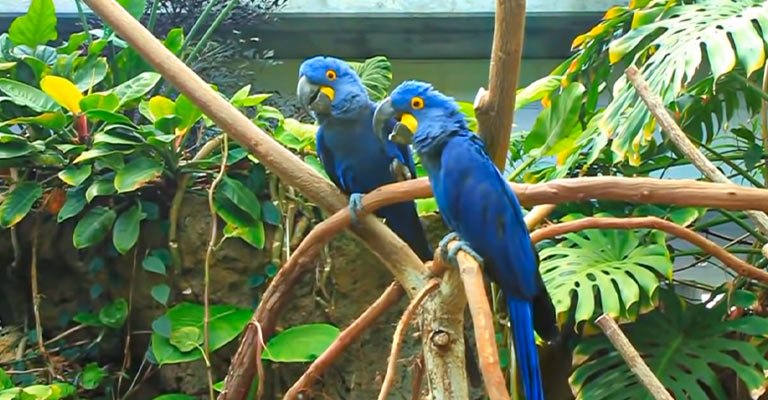
The answer to whether macaws can live peacefully alongside other birds isn’t as straightforward as a simple yes or no. Macaws have distinct personalities and needs that can clash with other bird species. Let’s explore the dynamics of a mixed bird household and what you should know before introducing a macaw into your home.
Understanding Macaw Behavior
Macaws are not just beautiful; they have unique behaviors that set them apart from many other birds. Known for their intelligence and social nature, these birds thrive on interaction, whether that’s with their human caretakers or other birds. However, they have strong personalities and can exhibit territorial behavior, particularly when they feel their space is being invaded.
For instance, if a macaw perceives another bird as a threat to its territory or resources, it may react aggressively. This could mean squawking loudly, chasing the other bird away, or even engaging in physical confrontation. Understanding this instinct is vital if you’re considering a multi-bird home.
It’s also important to note that macaws require a lot of attention. They need mental stimulation through toys, social interaction, and plenty of space to play. If they don’t receive proper stimulation, they can develop behavioral issues like screaming or feather plucking. Keeping this in mind, you might wonder if introducing other birds could either help or hinder their well-being.
Choosing Compatible Bird Species
When thinking about cohabitation, compatibility is key. Not all birds are suited to live with macaws. Larger birds, like cockatoos and other macaws, may fare better together since they can match each other’s energy and size. A smaller bird, such as a canary or parakeet, may struggle to hold its ground, leading to stress or injury.
Here’s a quick breakdown of some bird species that could potentially get along with macaws, keeping in mind that a lot depends on individual personalities:
- Other Macaws: They often do well together since they can communicate and socialize effectively.
- Cockatoos: With similar social needs, they might form a bond, but watch out for dominance behaviors.
- Larger Parrots: Such as Amazons, they can sometimes cohabitate peacefully with macaws.
On the flip side, smaller birds like finches or lovebirds are generally at risk and can significantly stress a macaw. If you’re still unsure about what might work best, consider reaching out to a bird expert or a vet specializing in avian care for guidance.
The Importance of Space and Environment
Creating a harmonious living situation for your birds is about more than just choosing the right species. Macaws need ample space to move around—both physically and visually. If they feel cramped or unable to retreat from other birds, it can lead to stress and aggression.
Setting up a spacious aviary or using separate cages can really help. Ideally, these environments should allow birds to see each other while still having room to avoid conflict.
Here’s how to set up a peaceful cohabitation:
- Separate Cages: Initially, house the birds in separate cages near each other so they can get used to one another.
- Supervised Interaction: Once they seem comfortable, allow supervised playtime together in a neutral space.
- Personal Space: Ensure each bird has its own perch and toys to prevent jealousy over possessions.
Monitor their interactions closely. If you notice any signs of stress or aggression, you may need to separate them again.
Monitoring Interactions
Once you’ve introduced other birds into your macaw’s life, it’s essential to keep a close eye on their interactions. This is especially important in the early days. You might find yourself playing the role of the referee during playtime, but that’s part of ensuring everyone feels safe and secure.
Watch for signs of aggression or stress in both your macaw and other birds. Some common behaviors include:
– Body Language: A puffed-up macaw might be feeling threatened, while a bird that is flapping wildly could be scared.
– Vocalization: Excessive squawking can indicate that the macaw is unhappy or feeling challenged.
– Chasing or Nipping: If you see your macaw being overly dominant or aggressive towards another bird, it’s crucial to intervene.
By staying observant, you can create an environment where all your birds can thrive together. If you notice persistent issues, you may need to separate the birds permanently to ensure everyone’s well-being.
The Role of Diet and Health
Diet plays a vital role in the overall health and behavior of birds. Macaws, like other parrots, require a balanced diet rich in fruits, vegetables, nuts, and specially formulated pellets. If a macaw is not receiving proper nutrition, it might become irritable or aggressive, making interactions with other birds more challenging.
Moreover, ensure that all birds in the home are healthy and free from diseases. Birds can be carriers of diseases without showing symptoms, and interactions between sick and healthy birds can lead to serious health issues. Regular check-ups with a vet who specializes in avian care can help keep your feathered friends in tip-top shape.
Sharing a diet with other birds can be tricky, especially since different species have different nutritional needs. Watching what each bird is consuming is essential. If you’re putting them all on a similar feeding schedule, be sure to cater to their individual diets to avoid conflicts or health problems.
Keeping macaws with other birds can be a rewarding adventure, but it requires careful consideration and planning. Each bird has its own personality and needs, making it essential to find the right companions and create a comfortable environment for everyone.
By understanding macaw behavior, choosing compatible species, ensuring plenty of space, monitoring interactions, and maintaining good health and diet, you can create a balanced and harmonious living situation. Remember, the goal is to enhance the lives of your birds, allowing them to thrive together while reducing stress and fostering friendship. So, take your time, observe closely, and enjoy the colorful chaos that comes with a multi-bird household!
